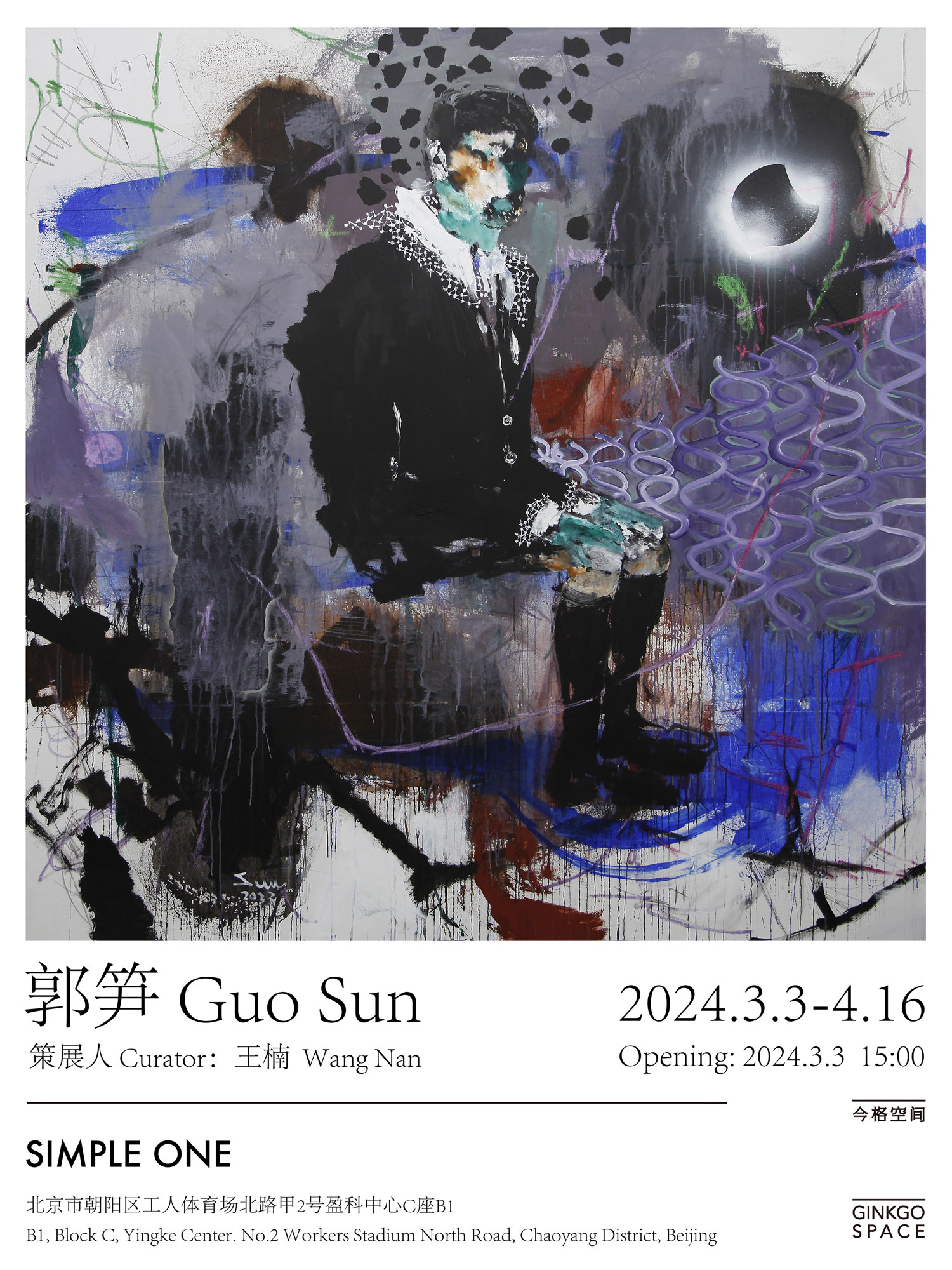展期 Period:
2024.3.3—2024.4.16
艺术家 Artist:
策展人 Curator:
王楠 Wang Nan
主办 Host:
地点 Venue:
新闻稿 Press Release:
SIMPLE ONE将于2024年3月3日至4月16日与今格空间在北京共同举办艺术家「郭笋」同名个展,并邀请王楠担任策展人。
郭笋的绘画处在很多风格元素的交汇点上,情感充沛又高度理性,艺术家个人化的探索延续了欧洲表现主义的绘画传统。此外,他的画面透露出对中国写意精神的谙熟,诸如“守拙”、“留白”、“意境”、“虚实” 等。
本次展出的作品以丙烯为主,材料的水溶性被发挥到极致。笔触被摒弃之后,通过涂抹、喷绘、刮刷、勾勒、留白、流淌和覆盖的反复操作,层次间产生即兴而微妙的相互作用。有机的不规则的色块和形状,层层加叠后仍然保留着可呼吸的透明性,艺术家思索和尝试的痕迹都在画布上清晰可寻。油画棒的书写和涂鸦在视觉维度间强势地穿插,被有意地暴露或遮盖,当线条独立于造型而且带有挑衅性,除了增加时间的动感,也增强了画面的冲突和平面性。郭笋对材料、肌理和绘画性的高度敏感,节奏和每一个细节都在理性的掌控之中,包括视觉上的冲击力,以及画面的生拙感和未完成感。
艺术家通过模糊面部特征或是将形象符号化实现对多样性身份的描述,画面中的形象跨越年龄、性别、阶层甚至族裔来逃避惯性的思维逻辑和评判体系。身份或者人物角色被视觉因素建构起来,是复杂、含混并且可以在不同语境下转换的,而观看者能够看到和理解的图景,永远有着局限和相对性。在杂糅了欲望和冲突的大环境下,郭笋以视觉的方式思索着人们的疏离与迷失。他的绘画折射出对人类自身脆弱性的敏感洞察,就像苏珊·索林斯所说的那样,“我们思考着自身和周围世界的关系,并去审视那些看似无法解释的体验”。
郭笋,1975年出生于中国山东,1998年毕业于山东艺术学院油画系。2000年开始居住,学习于德国法兰克福,2008年毕业于德国汉堡国立美术学院自由艺术系,跟随Nobert Schwontkowski教授,获硕士学位。现任教于山东大学。
特别鸣谢
文章撰写:西萌
翻译:易涵琪
SIMPLE ONE will co-organize a solo exhibition by Guo Sun titled “Guo Sun” in Beijing with Ginkgo Space from March 3rd to April 16th, 2024, inviting Wang Nan as the curator.
Guo Sun’s paintings exist at the intersection of various stylistic elements, blending emotional richness with a high degree of rationality. The artist’s personalized exploration continues the tradition of European expressionism. Additionally, his works reveal a familiarity with the spirit of Chinese freehand brushwork, incorporating principles such as “keeping simplicity” “leaving blank spaces” “creating mood” and “balancing void and substance”.
The works in this exhibition primarily employ acrylic, with the water-soluble nature of the material pushed to the extreme. After discarding traditional brushstrokes, the artist engages in repeated techniques involving smearing, spraying, scraping, outlining, leaving blank spaces, flowing, and covering. The layers interact spontaneously and subtly, forming irregular blocks and shapes that retain breathable transparency even after multiple layers. The traces of the artist’s contemplation and experimentation are clearly visible on the canvas. The powerful strokes and graffiti of oil pastels assertively intertwine between visual dimensions, intentionally exposed or covered. The independence of lines from form adds dynamism, enhancing the conflict and flatness of the composition. Guo Sun's heightened sensitivity to materials, textures, and the art of painting is evident in every detail, including visual impact, rawness, and a sense of incompleteness in the composition. The bold strokes and graffiti of oil pastels assertively intersperse between visual dimensions, intentionally exposed or covered. The independence of lines adds dynamism to the passage of time while enhancing the conflict and flatness of the composition. Guo Sun’s heightened sensitivity to materials, textures, and the art of painting is evident in every detail, including the visual impact, the rawness, and the sense of incompleteness in the composition.
The artist achieves a description of diverse identities by blurring facial features or symbolizing images, allowing these images to transcend age, gender, class, and even ethnicity, escaping habitual logic and evaluation systems. Identities or personas constructed through visual elements are complex, ambiguous, and transformable in different contexts, and the scenes viewers can see and understand are always limited and relative. In the amalgamation of desires and conflicts, Guo Sun visually contemplates the alienation and loss experienced by people. His paintings reflect a sensitive insight into human vulnerability, as Susan Sollins says, “We reflect on our relationship with ourselves and the surrounding world and examine those seemingly inexplicable experiences.”
Born in Shandong in 1975, Guo Sun graduated from the Oil Painting Department of Shandong Academy of Arts in 1998 under the guidance of Professors Yan Ping and Gu Liming. In 2000, he pursued further studies in Frankfurt, Germany, and graduated in 2008 from the Free Art Department of the University of Fine Arts in Hamburg, Germany, under the mentorship of Professor Norbert Schwontkowski, obtaining a master’s degree. Currently, he teaches at Shandong University.
Special thanks
Article written by: Xi Meng
Translated by: Yi Hanqi

